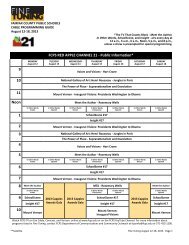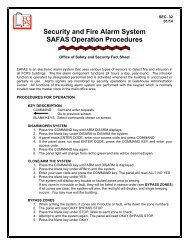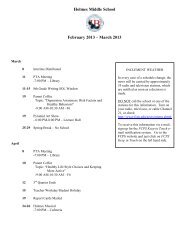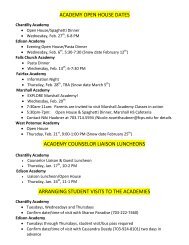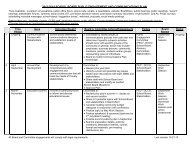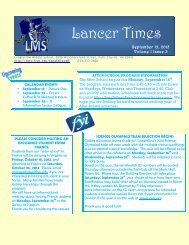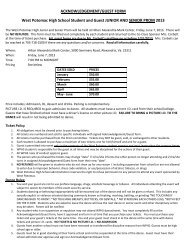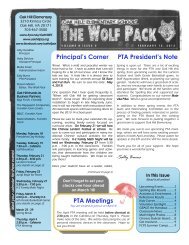COMMUNITY DIALOGUE - Fairfax County Public Schools
COMMUNITY DIALOGUE - Fairfax County Public Schools
COMMUNITY DIALOGUE - Fairfax County Public Schools
Create successful ePaper yourself
Turn your PDF publications into a flip-book with our unique Google optimized e-Paper software.
<strong>COMMUNITY</strong> <strong>DIALOGUE</strong><br />
<strong>COMMUNITY</strong> MEETINGS<br />
Will Responsive Classrooms be discussed<br />
Did the SR&R Committee agree to the schedule? It's my understanding they specifically<br />
requested some of the meetings be held on weekends and/or at times other than evenings<br />
Will the dialogues be structured so that the community can speak directly to committee members,<br />
or will we talking to ourselves?<br />
PARENT NOTIFICATION<br />
I am a parent with three students currently enrolled at Lees Corner Elementary School. I am<br />
interested in how the review process is proceeding and would like to ask specifically about the<br />
discussion on the parental notification issue.<br />
I am in favor of requiring parental notification to the disciplinary process. I understand that the<br />
issue is complex, but feel strongly that parents are the key part of the discipline process.<br />
Are there any more public meetings that will address the issue, or should I compose a letter? Is<br />
there anyone specifically I should speak to? What resources are available on the web (or in other<br />
media) for me to review. Thank you for your assistance in this matter.<br />
Please feel free to contact me via the number below, should you like to discuss anything with me.<br />
While I can't attend the meeting, I thought I would share a parent's perspective on the policy that<br />
was in place in 2011. I don't know if it has changed since then, but I found it very concerning that<br />
before I received a phone call, my child and his property had been searched and he was told to<br />
confess and sign a statement based on an accusation of another child. Cooper Middle school had<br />
involved the police and not read him any rights, instead they told him it was in his best interest to<br />
confess to buying pot from another student. The first I knew about it was after he had written and<br />
signed something. I'm sure that was not in his best interest and seemed to go against his rights.<br />
Clearly the Principal and Vice Principal were authority figures and he did as he was told, but I<br />
don't think they should have that right with minors<br />
I would like to state that when children are accused of violating the rules beyond misbehaving, the<br />
parents must be notified immediately. Teachers/Counselors and Principals should not take on the<br />
job of "interrogating" the child without the parent's knowledge AND presence of the parents.<br />
School staff should be responsible for allowing the child to contact his/her parents to inform them<br />
about teh situation as well.<br />
Page 1 of 11
<strong>COMMUNITY</strong> <strong>DIALOGUE</strong><br />
Bottom line, a child should not be confined without his parents to face the staff when a serious<br />
incident is on the table as this would have further implication on the child's psychological state adn<br />
how he perceives the school and the staff authority.<br />
SR&R<br />
Having had four children in FCPS, two already graduated and one about to graduate, I encourage<br />
you to add the following to your discipline policy so children are not marginalized and are given a<br />
chance to redeem any errors in judgment they might make. I believe a punitive approach to<br />
discipline is a failure in our school system because it marginalizes kids and doesn't give them a<br />
chance to improve. This has caused several suicides. This is unconscionable.<br />
I believe the following should be added to the SRR booklet:<br />
• Parent notification - Except in exigent circumstances (i.e., immediate danger to person or<br />
property) parents must be notified before students are questioned or asked to sign<br />
statements<br />
• Each individual school should be allowed to administer its discipline as it sees fit.<br />
Evidence-based disciplinary policies - Data shows, overwhelmingly, that punitive actions that push<br />
kids out of school do NOT work. School districts around the country are shifting from zerotolerance<br />
to prevention and intervention<br />
I am strongly opposed to zero tolerance disciplinary practices being used in FCPS, especially with<br />
regard to drugs or weapons. I believe that each incident should be resolved based on the<br />
circumstances of the specific case, and that parents should be brought into the process at the<br />
very beginning of any proceedings.<br />
I feel that the FCPS system is doing students and the community more harm than good when they<br />
summarily expel students discovered possessing any amount of any item that can be classified as<br />
a drug or weapon.<br />
My son went through this experience 3 years ago. He was banished to the Reston self learning<br />
site. Most of the kids there fell way behind. We were lucky, he finished two years of high school in<br />
6 months (tells another story) and went on to get a good job. However, to this day he is very bitter<br />
and feels like he missed his youth. While he made a mistake, he should have had to work hard to<br />
redeem himself, prove himself worthy of staying in his school and got some help. However, he<br />
was tossed aside. He was very honest when he was questioned by the school and admitted his<br />
mistake. His reward......an attack on his character at the "hearing" and expulsion. He even told<br />
them where the kids sell pot. They laughed at him and told him that was his perception. At that<br />
moment he decided never to trust anyone or admit his mistakes.<br />
Suspend the kids and set up an earn back program with check points each month on progress. If<br />
they miss to meet expectations twice, they are out. At least you give them hope and something to<br />
Page 2 of 11
<strong>COMMUNITY</strong> <strong>DIALOGUE</strong><br />
work towards and provide a little support. Abolish that ridiculous "Hearing Board". All they do is<br />
impose the sentence after they express their opinions on your character. Waste of time and<br />
money.<br />
If this does not change I would strongly encourage every kid to memorize this: "I don't recall", Let<br />
me call my lawyer".<br />
I find that the SR and R is very well written. I have teenagers as well as younger children and my<br />
only comment (anonymously, please) is that, in particular to dress code, some of the high schools<br />
do not enforce this enough. There are girls with pencil skirts up to their bottoms and even<br />
teachers dressing inappropriately with low cut sweaters, etc. I would say that needs to be<br />
addressed within the schools themselves but as for the SR and R book, it's excellent.<br />
I will probably not be able to attend the upcoming meetings but wanted to express my concern for<br />
what I feel is too lenient of a punishment for bringing a gun to school. If I am reading the SR&R<br />
correctly, I walk away with the understanding that there is a required 10 day suspension with the<br />
recommendation for expulsion. (If I am not reading this correctly, please let me know). As a<br />
parent and alumni of Robinson where a student chose to bring a gun to school recently, it horrifies<br />
me that she could ever be allowed back at Robinson or any <strong>Fairfax</strong> <strong>County</strong> School. Bringing a<br />
loaded gun to school should be grounds for immediate, permanent expulsion. With all the daily<br />
shootings in America and attention that this issue is receiving, I would think this should be<br />
discussed and easily agreed upon. There should be no leniency for anyone who brings a gun to<br />
school.<br />
This is to say that the current policy is much improved over the previous, inflexible one. I had<br />
experience with the earlier one which I found very unsatisfactory and would not pass the<br />
ridiculous test.<br />
(My third grader was suspended for two days for a pencil poke that did not break the skin.) Thank<br />
you for changing it.<br />
When will the preliminary recommendations of the committee be available for review prior to the<br />
community dialogues?<br />
I wish to ask that the ad-hoc committee evaluate the current Student Rights<br />
and Responsibilities Handbook for the inclusion of teacher/student bullying. FCPS state that one<br />
of their missions is to provide a safe environment conducive to learning. The current handbook<br />
only mentions student/student bullying. There have been incidences where teachers have<br />
bullied/harassed students. The current handbook fails to address this situation. I believe that a<br />
simple look at other school systems, Baltimore <strong>County</strong> as an example, handbooks will show that<br />
teacher/student bullying has been specifically mentioned.<br />
I regret that I will not be able to attend the SR&R meetings but wanted to share my views and<br />
strong support for the following changes to Student Rights and responsibilities for FCPS. I<br />
strongly encourage FCPS to adopt the following:<br />
Page 3 of 11
<strong>COMMUNITY</strong> <strong>DIALOGUE</strong><br />
Parent notification - Except in exigent circumstances (i.e., immediate danger to person or<br />
property) parents must be notified before students are questioned or asked to sign statements<br />
Student rights - Students have a constitutional right to remain silent, which should be stated<br />
outright in the SR&R. Any student who declines to answer questions about possible disciplinary<br />
infractions should not be declared insubordinate or disrespectful.<br />
Prevention first - Prevention, Intervention, Rehabilitation and Restoration (PIRR) efforts are<br />
preferred over punitive measures.<br />
Prevention is safer. Intervention is instructive. Rehabilitation and restorative justice turn negative<br />
situations into learning experiences that heal.<br />
Evidence-based disciplinary policies - Data shows, overwhelmingly, that punitive actions that push<br />
kids out of school do NOT work.<br />
School districts around the country are shifting from zero-tolerance to prevention and<br />
intervention.<br />
I have had personal experience with some of the current adverse SR&R and FCPS discipline<br />
policies and know that they have an extremely negative effect on FCPS students and their<br />
families. I am happy to share my experience if needed.<br />
This e-mail is submitted to the FCPS Ad Hoc Community Committee on Students Rights and<br />
Responsibilities as feedback on the committee's preliminary recommendations for changes to the<br />
SRR Handbook.<br />
I write as the parent of two children who attended and graduated from FCPS, one of whom taught<br />
for several years in several school systems, albeit not in FCPS. I draw on my personal<br />
experience observing my children's classes for one day each year in K through 8th grade, on my<br />
daughter's experience teaching in several school systems, on my many conversations with<br />
veteran teachers around the county, many first-person books by teachers and principals,<br />
and many comments by veteran teachers and principals on education websites and blogs.<br />
The SRR Handbook as well as the preliminary recommendations for changes largely focus on<br />
issues raised by serious misconduct.<br />
However, according to veteran teachers and principals -- particularly from low-SES-area schools -<br />
- the major obstacle to effective instruction is not serious misconduct but rather endemic minor<br />
misconduct. This misconduct constantly disrupts instruction, causes teacher burnout, and creates<br />
on-going peer pressure among students that perpetuates the endemic minor misconduct. Such<br />
minor misconduct includes, for example, momentary tardiness, talking to friends during class, not<br />
paying attention to instruction, asking superficially reasonable questions or making superficially<br />
reasonable requests solely to get attention or to "test" the teacher, moving around the classroom,<br />
rocking back and forth in the chair, dropping books or pens, fooling around on computers, making<br />
attention-getting noises or gestures, and ignoring or challenging routine teacher directives.<br />
It appears that in FCPS, as in most school systems, teachers and principals are pretty much on<br />
their own regarding such minor misconduct -- that is, there is no FCPS-endorsed approach to<br />
Page 4 of 11
<strong>COMMUNITY</strong> <strong>DIALOGUE</strong><br />
classroom management or discipline policies at the teacher or principal level that<br />
directly addresses how best to prevent or remedy the minor misconduct. As a consequence, it is<br />
likely that some teachers condone minor misconduct that should not be tolerated and that some<br />
teachers react to minor misconduct with overly harsh or otherwise unproductive responses. It is<br />
similarly likely that principals vary widely regarding what they expect teachers to do when faced<br />
with minor misconduct as well as regarding the support -- or condemnation -- that principals<br />
provide to teachers who seek to establish and enforce appropriate behavior standards.<br />
The SRR Handbook (like media coverage of school discipline issues generally) promotes a<br />
legalistic/due-process approach to behavior and discipline issues. Such an approach may be<br />
appropriate when the alleged misconduct involves serious misconduct (guns, drugs, fighting) or<br />
raises serious constitutional issues (censorship, locker searches). However, a legalistic/dueprocess<br />
approach is inappropriate -- and counter-productive -- when the alleged misconduct<br />
involves routine day-in-day-out admittedly wrong but minor classroom disruptions. In these latter -<br />
- and much more common -- situations, the legalistic/due-process approach creates unnecessary<br />
obstacles to quick/efficient disciplinary consequences.<br />
It is time to put the discipline back in the hands of the teachers administrators. All students need<br />
to understand there are consequences to their actions! Not everyone gets a trophy, not everyone<br />
gets an A on the test....but work hard and good things will happen! Let's get back to the basics<br />
and teach kids how to think..... not what to think !!!<br />
" give a man a fish and feed him for a day....teach a man to fish and feed him for a lifetime "<br />
As a parent of two children who attend or attended FCPS, I would like to share some thoughts on<br />
student discipline:<br />
Principals should have fairly wide discretion about whether or not to report certain types of<br />
infractions to the police.<br />
Punishments should be meted out for undesirable behavior, but should probably be more<br />
creative than suspension from school. Suspension seems to make the problems that the<br />
student and his/her family are facing even worse.<br />
I think that suspension and expulsion should be used only when the safety of the students and<br />
faculty/admin are at risk because of the student’s behavior, or for chronic repeated offenses.<br />
I would hope that principals and guidance depts., or other trained staff, attempt to uncover and<br />
address the cause of the student’s behavior. Sometimes the cause could be immaturity or<br />
boredom, but it could also be something that requires counseling or other services for the<br />
student and the family.<br />
I hope that you are soliciting comments from students, as well as from adults. Many times,<br />
students know better than we, exactly what is going on in the schools and why. They would<br />
also have ideas about what would be effective discipline.<br />
I live in Centreville zip 20121, Sully District, and have a son, 9 grader, in Centreville HS.<br />
Page 5 of 11
<strong>COMMUNITY</strong> <strong>DIALOGUE</strong><br />
I recently had a real experience on how the school handled discipline and I would like to<br />
contribute my opinions to make our school system better.<br />
Purpose:<br />
School is the first place to show student the right things to do. Therefore, discipline authorized<br />
persons must fully investigate; understand a circumstance that leads to an incident. They must be<br />
fair and careful when judging student mistake before handing down a verdict.<br />
Suggestion:<br />
Student must have a right to contact parents before writing down a record at school officer<br />
request. The reason is that they are under 18, they are so soft, scare even panic while writing<br />
down anything that can later against them.<br />
All parties involved in the incident must be considered and evaluate fairness. All parties must<br />
know the level of discipline others. Avoid discrimination or cover up.<br />
Parents must be conferred to induce the first discipline to avoid school officer's subjective, not<br />
fully understand an incident and emotional decision.<br />
What are inside the package bring home to parents? Is there a student’s report on the incident?<br />
There must be a list of some must have items. Parents must fully acknowledge on what their child<br />
did and wrote.<br />
What if the school did not follow the standard procedure as listed in the handbook? For<br />
example, in the student handbook page 44 ( 2,c,1) notes school gives student a discipline<br />
decision and the right to appeal. However, school just said to student “ You got one day<br />
suspension” and that is it.<br />
It isn’t a common sense to appeal to the Principle about Assistant Principal’s discipline decision.<br />
They are the same system and the decision will be uphold. It costs time to parents; they leave<br />
work, lost income to appeal a not-good decision that affects to their child’s life. They sit, wait and<br />
hope then finally find out that the Principle did not even know their child’s name.<br />
My suggestion is having an independent board (parents, different school personnel or special<br />
board ) to review a appeal to avoid moving thing from left hand to right hand of the same person.<br />
If a review found that school officer did not follow the handbook procedure, the case will be<br />
dismissed.<br />
English is not my first language, so sorry if it confuses you. I can answer your questions if you<br />
want.<br />
I told my son is that “ I see in the screen many times, the police arrests an adult suspect with an<br />
announcement : you have the right to keep silent until you have a lawyer. In your case, a 14-yearold<br />
student was forced to write a report on what happened in panic without parents acknowledged<br />
and got an unilateral verdict without any mention – right to appeal. The other two who were<br />
involved in the same incident, one was not even mentioned and the other who directly triggered<br />
the incident got nothing.”<br />
School behavior should be a standard to everyone.<br />
Fairness and non-discrimination must be a standard in school.<br />
I never want anyone experience the same thing as I did so I write this email.<br />
This comment is for the Ad Hoc Committee that is reviewing <strong>Fairfax</strong> <strong>County</strong>’s school disciplinary<br />
practices and the Student Rights and Responsibilities Handbook. I have concerns about the<br />
implementation and enforcement of the dress code that is listed on page 14 of the current<br />
handbook. I don’t really have concerns about the published dress code itself. It seems to me a<br />
Page 6 of 11
<strong>COMMUNITY</strong> <strong>DIALOGUE</strong><br />
reasonable response to an issue that is inherently difficult to codify.<br />
My experience as a parent, however, is that the schools’ the enforcement of the policy<br />
is confusing and inconsistent. The problem came to our attention last week, when I received a<br />
call at work from my tearful daughter (a sixth-grader at Kent Gardens Elementary) to say that she<br />
had been “dress-coded” by the principal because her shorts did not extend past her fingertips<br />
when her arm was extended, and that I needed to come to the school. I did so (from downtown<br />
D.C.). The principal told me that the shorts violated the “fingertip” rule – a rule she stated is<br />
countywide – and did not make any claim that the shorts are revealing or tight (they definitely are<br />
not). I pointed out that the shorts were in fact my daughter’s favorite pair and that she had worn<br />
them numerous times at Kent Gardens in the spring and fall, including in her school picture,<br />
without anybody at the school ever saying a word. In light of that history, we can only view the<br />
principal’s dress-coding action as arbitrary. The principal agreed that I had a valid point, but I’m<br />
not sure what she will do about it. The incident was certainly a problem for me because I missed<br />
work, but suggests an even bigger problem for the school system because Inconsistent<br />
enforcement creates confusion about what the rules actually are, and fosters disrespect for the<br />
rules and rule makers.<br />
This incident led me to have further discussions with my sixth-grade daughter and also my<br />
eight-grade daughter who attends Longfellow. They both reported various ways in which the<br />
dress code is enforced erratically or inconsistently. For example, they both said that some rules,<br />
such as the “fingertip” rule for shorts, are rarely enforced at all. My eighth-grader said there is<br />
more enforcement in general in middle school, although she said that some teachers enforce the<br />
rules more than others. In addition, there appears to be inconsistency in how the code is<br />
enforced. At Longfellow, offenders are usually told to change into their gym clothes, and parents<br />
are only contacted in the case of repeat offenders. Relatedly, my daughters noted that “first<br />
offenders” are often just warned – a reasonable approach that was not utilized with my sixthgrader.<br />
Whether or not my daughters’ observations/perceptions are correct, the bottom line is that<br />
they unfortunately view enforcement of the dress code as arbitrary and a way in which kids can be<br />
“unfairly” singled out for behavior that they thought was OK.<br />
Perhaps part of the problem is that some schools have grafted overly strict “rules” onto the<br />
dress code guidelines listed in the handbook. I don’t see the “fingertip” rule for shorts in the<br />
handbook, which only prohibits shorts that are actually revealing or indecent. The “fingertip” rule<br />
goes much further and, in fact, prohibits clothing that kids routinely wear in public and elsewhere.<br />
My guess is that this is why school staff simply are not willing to enforce it. And I applaud their<br />
common sense. Frankly, I think that the principal’s actions at Kent Gardens last week did more to<br />
bring attention to my daughter’s shorts than the shorts themselves have ever aroused. My<br />
daughter was truly embarrassed by being singled out, and I don’t see what purpose was served<br />
by the “dress-coding” action.<br />
Whatever the handbook says, my view is that inconsistent enforcement of the dress code is<br />
as bad as – if not worse than – no enforcement. Kids need to know what they can and cannot do,<br />
and they certainly have no respect for rules that are enforced only at the whim of teachers and<br />
administrators. I urge the Committee to consider not only how the handbook reads, but also how<br />
it is enforced on the ground at the schools. Thank you for receiving this comment.<br />
Page 7 of 11
<strong>COMMUNITY</strong> <strong>DIALOGUE</strong><br />
MISCELLANEOUS<br />
I do not anticipate being able to attend the Community Dialogue meetings. Please accept my<br />
input below.<br />
I am strongly opposed to zero tolerance disciplinary practices being used in FCPS, especially with<br />
regard to drugs or weapons. I believe that each incident should be resolved based on the<br />
circumstances of the specific case, and that parents should be brought into the process at the<br />
very beginning of any proceedings.<br />
I feel that the FCPS system is doing students and the community more harm than good when they<br />
summarily expel students discovered possessing any amount of any item that can be classified as<br />
a drug or weapon.<br />
I'm writing because I recently graduated from the University of Virginia and wrote my senior thesis<br />
on the efficacy and morality of zero tolerance policies.<br />
I wanted you to know that I first became interested in this topic after reading about the tragic<br />
deaths of both Josh Anderson (whose sister was in my graduating class at TJHSST) as well as<br />
your son, Nick. Please know that I am so sorry for your loss. Having three younger siblings, I felt<br />
deeply for your family during that difficult time. Indeed, it is because of the Nick and Josh that I<br />
chose to research the topic of zero tolerance across the country and to produce my senior thesis.<br />
I applied for grants from the University and spent three weeks last summer driving through the<br />
Midwest and interviewing school administrators to gauge how they understand and implement<br />
zero tolerance policies. As I'm sure you know, these policies are in place in almost every school<br />
district across the country in some form but, as I discovered through my research, the term "zero<br />
tolerance" is not clearly defined and administrators vary widely in the ways in which they choose<br />
to implement these policies. Indeed, some administrators are quietly rebelling against policies that<br />
they see as unjust by choosing not to implement them.<br />
I'm sure you have plenty of people who know much more than me that are advising you on the Ad<br />
Hoc Community Advisory Committee on the SR&R, but I wanted to reach out and express my<br />
condolences as well as to offer any help. I would be happy to send along a copy of my thesis or to<br />
speak with you about my experiences researching zero tolerance if you feel I could be of any help.<br />
I feel very strongly about this topic and cannot tell you how relieved and excited I am to see some<br />
real progress being made in this area. <strong>Fairfax</strong> <strong>County</strong>'s disciplinary process was in serious need<br />
of reform and I'm glad to hear that someone has taken up the mantle.<br />
I was unable to make the community dialogues but wanted to register my opinion for any changes<br />
to the SR&R. I believe that:<br />
1) students have a right not to self-incriminate,<br />
2) parents have a right to be notified before their kids are questioned,<br />
3) the SR&R should delete punitive practices and implement proven preventive and<br />
intervention approaches,<br />
Page 8 of 11
<strong>COMMUNITY</strong> <strong>DIALOGUE</strong><br />
4) we should adopt a Second Chance program for first-time marijuana users, and<br />
5) we need to implement later HS start times to reduce sleep deprivation to improve<br />
student reasoning abilities which will reduce bad behavior choices.<br />
I hope that you can honor these requests since I know they are the same as the<br />
recommendations of<br />
<strong>Fairfax</strong> Zero Tolerance Reform so many, many FCPS parents support these changes.<br />
I have two children currently in FCPS elementary schools and was closely involved with a niece<br />
who attended FCPS K-12 graduating in 2009. As a concerned parent I ask that you please<br />
consider the following points as FCPS reviews it's discipline policy and revises the SR&R:<br />
FIRST: Adopt and Anti-Bullying Program<br />
FCPS does not have an anti-bullying program. FCPS has a definition of bullying, an empty<br />
statement that bullying is not tolerated, and a day where kids wear red shirts and make posters<br />
that say “Say NO to drugs and bullying”. Bullying awareness is so mainstream these days and yet<br />
FCPS, which considers itself a nationwide leader, is very far behind the ball. The current ‘policy’<br />
is lip service and the result is that FCPS encourages aggressive behavior by its lack of action<br />
against it.<br />
It is time for FCPS to turn to an outside source with proven bullying expertise. One I know of from<br />
reading, and also from a friend whose school district (in Seven Fields, PA) just adopted it, is<br />
based on the research of Dan Olweus. I’m sure there are others and that it would be easy to form<br />
a committee to research options for FCPS to consider.<br />
The effort to revisit and re-vamp the SR&R handbook is incomplete to a point of negligence if it<br />
does not finally address bullying in <strong>Fairfax</strong> <strong>County</strong> <strong>Schools</strong>!<br />
The current SR&R doesn’t say what the schools are responsible to do to protect children whose<br />
rights are violated by other students. This document needs to state clear consequences for<br />
SR&R violations. Students, parents and school administrators need to be on the same page from<br />
the start for any program to work.<br />
FCPS does not currently provide administrators with effective means to deal with today’s<br />
problems. A bully’s right to public education should not trump other’s rights to safety and an<br />
environment conducive to learning but in FCPS it currently does.<br />
SECOND: Decrease FCPS involvement regarding student’s illegal actions<br />
The handbook has a lot to say about students bringing illegal drugs, weapons, etc to school. It<br />
has more to say about that than about expected behavior and consequences of violating SR&R.<br />
My opinion is that the schools should call the police and stay out of it when an illegal action<br />
happens on a school campus. Police departments should be capable of handling issues involving<br />
minors with discretion, etc. <strong>Schools</strong> have enough to do without enforcing the law. FCPS could<br />
simply cite illegal activity on campus as a violation of SR&R, albeit one of the highest, and treat it<br />
the same as any other activity which could cause equal harm to others.<br />
Page 9 of 11
<strong>COMMUNITY</strong> <strong>DIALOGUE</strong><br />
LAST: Create an Alternative School to handle serious SR&R violators<br />
I think students who are aggressive to the point of physically or mentally harming others (via<br />
bullying, physically harming, threatening, bringing illegal drugs to school with intent to sell,<br />
bringing weapons to school) should be removed from the main school system and placed in an<br />
alternative public school staffed by people specially trained to deal with these problems. There<br />
should be an opportunity to return to general FCPS schools depending on the severity of the harm<br />
caused to another student, and the degree to which the student demonstrates appropriate<br />
behavior consistent with SR&R. Yes, I’m talking about some sort of public reform school with a<br />
parole option. I understand that this is old school and not politically correct. However, it would be<br />
more effective and cognizant of the general student body’s rights than what is happening now.<br />
I would like to express my opinion that the list of what kids can not do in school has gotten way<br />
out of hand. Almost every day my 5-year old comes home with another account of something that<br />
is forbidden. I find the school atmosphere not encouraging but stifling and heavy-handed. The<br />
public school mantra is heavy on how each child is "special" and "individual", but the reality seems<br />
to be an attempt to control every move a child makes from kindergarten on, and to create a<br />
lockstep classroom. Some examples: children cannot run on the playground; children cannot<br />
play chase or tag; children cannot bang their play cars together; children cannot touch each other.<br />
When I was a youngster, teachers would report to the parent if a child was hitting or pushing; in<br />
this crazy down the rabbithole universe of public school today, I get reports that my child is<br />
"touching" other children and I do not even know what kind of touching it is- apparantly, any<br />
touching is verboten, even a hug. I have a very negative view of the public school system at this<br />
time, and have even considered homeschooling. I also look at the scowl on a teacher who is<br />
recounting my child's misdemeanors and I wonder, where is the joy? Just a few thoughts<br />
Here is a recent case that presented itself to me and brings to mind the disastrous effect of a lack<br />
of notification of parents and zero tolerance policy.<br />
A 7th grade student at Robinson Secondary (name withheld for confidentiality), was talking to a<br />
friend at a table, ironically enough, in a peer mediation class. It was the day of the Mayan Doom<br />
prediction. They were talking about a popular video game that most boys this age play. They were<br />
discussing ways to kill zombies, combined with the idea that the world might come to an end this<br />
day. They were discussing various fantasy weapons when another student overheard and then<br />
reported it to the teacher, who was young and inexperienced. She reported it to an administrator<br />
who sent it up the line. This was first period. The student was grilled for at least four hours without<br />
his parent there, who I would hope, would tell him to say nothing. The student like most, thinking<br />
that all they needed to do was tell the truth, did so, with catastrophic effect. The counselor and<br />
various other intimidating school officials swarmed the student. By the time that the parent was<br />
called this student was being referred for a psych evaluation. His locker had been searched as<br />
well. The parent resisted (good parenting) and said that she would take the student to a local<br />
facility herself. She took the student to Dominion and even though the student was never seen by<br />
a mental health professional for an evaluation, it was determined that he must stay overnight for<br />
observation. (he would, of course, be drugged as well) The parent was told that she could not take<br />
her student home, even though it was plainly stated on the intake the it was "voluntary". The<br />
parent declined and took the student to the local emergency room the next day. As a result<br />
Dominion called Child Protective Services. The psychiatrist at the emergency room gave this<br />
student a full clean release and said that he was ready to go back to school. This was not good<br />
Page 10 of 11
<strong>COMMUNITY</strong> <strong>DIALOGUE</strong><br />
enough for CPS who demanded that the mother take her student to an independent practitioner,<br />
which is where I met them. The family went on a short trip that weekend and when they got back<br />
the neighbors reported that the police were looking for them. CPS had called the police.<br />
The family is now at risk in this system. The student was not allowed to return to the class and<br />
they sit in a room by themselves for a block period every other day.<br />
This is the definition of insanity. Disgusting.<br />
Page 11 of 11



